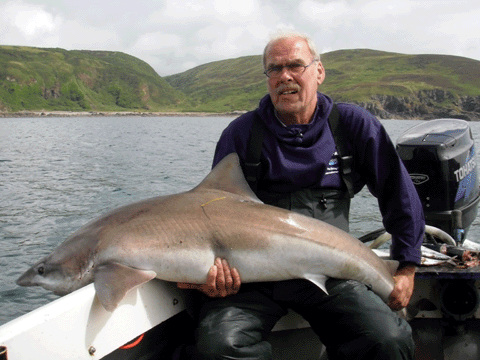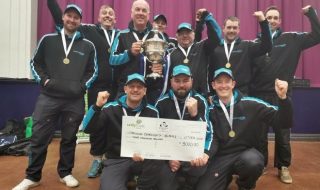“ 1000 sharks tagged in Scottish waters by sea anglers in less than one year. ”
The Scottish Shark Tagging Programme (SSTP) which is run by the Scottish Sea Angling Conservation Network (SSACN) has recently logged its 1000 fish, a major landmark for the new tagging programme.
The 1000th fish, was a 73 pound tope shark was caught by Jan Mejlink from Amsterdam on his annual fishing trip to Scotland.
The fact that Jan and his colleagues are willing to travel so far to enjoy their sea fishing highlights the economic impact sea angling can have on coastal economies and the necessity for healthy inshore fish stocks.
Ian Burrett, SSACN’s Project Director “We are delighted that so many fish have been tagged and the data returned to us. This data is crucial to allow appropriate management decisions to be made to ensure the survival of Scotland’s shark, skate and ray species.”
Tagging is the only method which offers the ability to gain an insight into the life history characteristics, migration movements and stock fluctuations of sharks, skates and rays without killing them.
Richard Lochhead, Cabinet Secretary for Rural Affairs and Environment, said: “With some shark populations critically endangered we need to take measures to protect and sustain sharks in Scottish waters. That’s why the Scottish Government is committed to shark conservation, as demonstrated by the ban I introduced on the barbaric practice of ‘shark finning’ last October.
“Shark tagging plays an important role in monitoring the sharks around Scotland’s coasts and helping us increase our knowledge of the marine environment and I’m delighted that we have surpassed 1,000 sharks tagged.”
The tagging programme which started earlier this year, and is part funded by Scottish Natural Heritage and Leader, relies on voluntary input from sea anglers to tag and record details of fish. Some interesting returns so far have included tope sharks originally tagged in Scotland being re-caught off Wales and the Azores; another tope shark being recaptured in the Solway 4 years after it was originally tagged there; and a pair of common skate being re-caught in the same place and same order, a year after their initial tagging.
Les McBride, a regular contributor to the programme, said “The feedback I have received from the project on the fish I catch is very interesting, knowing where my fish was last caught and how much it has grown increases my enjoyment of my sport as each tagged fish I catch has a story, and each tag I put in is the start of another one”.






